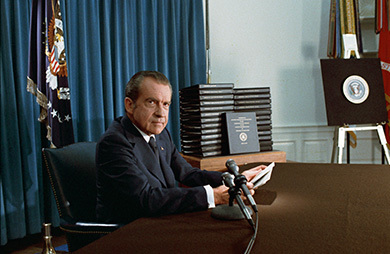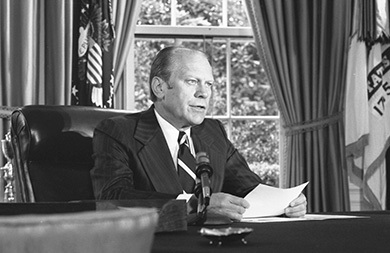| << Chapter < Page | Chapter >> Page > |

At the end of its hearings, in July 1974, the House Judiciary Committee voted to impeach. However, before the full House could vote, the U.S. Supreme Court ordered Nixon to release the actual tapes of his conversations, not just transcripts or summaries. One of the tapes revealed that he had in fact been told about White House involvement in the Watergate break-in shortly after it occurred. In a speech on August 5, 1974, Nixon, pleading a poor memory, accepted blame for the Watergate scandal. Warned by other Republicans that he would be found guilty by the Senate and removed from office, he resigned the presidency on August 8.
Nixon’s resignation, which took effect the next day, did not make the Watergate scandal vanish. Instead, it fed a growing suspicion of government felt by many. The events of Vietnam had already showed that the government could not be trusted to protect the interests of the people or tell them the truth. For many, Watergate confirmed these beliefs, and the suffix “-gate” attached to a word has since come to mean a political scandal.
When Gerald R. Ford took the oath of office on August 9, 1974, he understood that his most pressing task was to help the country move beyond the Watergate scandal. His declaration that “Our long national nightmare is over. . . . [O]ur great Republic is a government of laws and not of men” was met with almost universal applause.
It was indeed an unprecedented time. Ford was the first vice president chosen under the terms of the Twenty-Fifth Amendment, which provides for the appointment of a vice president in the event the incumbent dies or resigns; Nixon had appointed Ford, a longtime House representative from Michigan known for his honesty, following the resignation of embattled vice president Spiro T. Agnew over a charge of failing to report income—a lenient charge since this income stemmed from bribes he had received as the governor of Maryland. Ford was also the first vice president to take office after a sitting president’s resignation, and the only chief executive never elected either president or vice president. One of his first actions as president was to grant Richard Nixon a full pardon ( [link] ). Ford thus prevented Nixon’s indictment for any crimes he may have committed in office and ended criminal investigations into his actions. The public reacted with suspicion and outrage. Many were convinced that the extent of Nixon’s wrongdoings would now never been known and he would never be called to account for them. When Ford chose to run for the presidency in 1976, the pardon returned to haunt him.

As president, Ford confronted monumental issues, such as inflation, a depressed economy, and chronic energy shortages. He established his policies during his first year in office, despite opposition from a heavily Democratic Congress. In October 1974, he labeled inflation the country’s most dangerous public enemy and sought a grassroots campaign to curtail it by encouraging people to be disciplined in their consuming habits and increase their savings. The campaign was titled “Whip Inflation Now” and was advertised on brightly colored “Win” buttons volunteers were to wear. When recession became the nation’s most serious domestic problem, Ford shifted to measures aimed at stimulating the economy. Still fearing inflation, however, he vetoed a number of nonmilitary appropriations bills that would have increased the already-large budget deficit.
Ford’s economic policies ultimately proved unsuccessful. Because of opposition from a Democratic Congress, his foreign policy accomplishments were also limited. When he requested money to assist the South Vietnamese government in its effort to repel North Vietnamese forces, Congress refused. Ford was more successful in other parts of the world. He continued Nixon’s policy of détente with the Soviet Union, and he and Secretary of State Kissinger achieved further progress in the second round of SALT talks. In August 1975, Ford went to Finland and signed the Helsinki Accords with Soviet premier Leonid Brezhnev. This agreement essentially accepted the territorial boundaries that had been established at the end of World War II in 1945. It also exacted a pledge from the signatory nations that they would protect human rights within their countries. Many immigrants to the United States protested Ford’s actions, because it seemed as though he had accepted the status quo and left their homelands under Soviet domination. Others considered it a belated American acceptance of the world as it really was.
In 1972, President Nixon faced an easy reelection against a Democratic Party in disarray. But even before his landslide victory, evidence had surfaced that the White House was involved in the break-in at the DNC’s headquarters at the Watergate office complex. As the investigation unfolded, the depths to which Nixon and his advisers had sunk became clear. Some twenty-five of Nixon’s aides were indicted for criminal activity, and he became the first president impeached since Andrew Johnson and the first to resign from office. His successor, Gerald Ford, was unable to solve the pressing problems the United States faced or erase the stain of Watergate.

Notification Switch
Would you like to follow the 'U.s. history' conversation and receive update notifications?